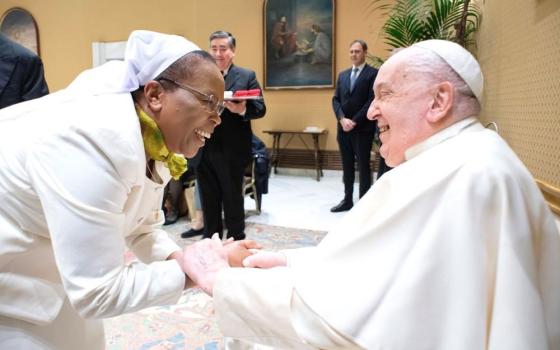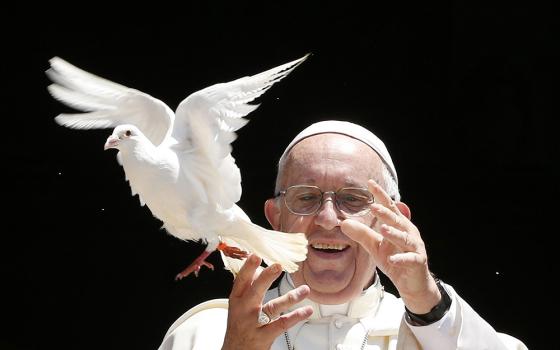Pope Francis kisses a Ukrainian flag carried by a group of Ukrainian children attending his weekly general audience in St. Peter's Square at the Vatican April 10, 2024. The pope prayed during the audience for peace in Ukraine, in the Holy Land and in Myanmar. (CNS/Vatican Media)
Pope Francis' passionate opposition to war and violence is likely to be one of his key legacies, along with his linking of peace with social justice and environmental protection.
And while his peace appeals were sometimes contested, not least in Ukraine and the Middle East, a more balanced appreciation of his overall priorities may already be emerging.
Francis died April 21, Easter Monday, at age 88.
"Francis prayed for an end to suffering in all the terrible wars across the globe, and this made him a pope of peace," Bishop Jan Sobilo, from Ukraine's frontline Kharkiv-Zaporizhzhia Diocese, told the National Catholic Reporter. "But he also spoke truth to all sides, didn't seek popular plaudits, and accompanied his prayers with practical steps. Since he was much more than a politician, his gestures weren't always understood."
'We should view his pontificate as one great prayer for an end to war and conflict and hope these reconciliation efforts gain momentum.'
—Bishop Jan Sobilo
War in Eastern Europe and the Middle East confronted the Argentine pontiff from the start.
In March 2014, a year after his election, Russia forcibly annexed Ukraine's Crimea peninsula and unleashed a remorseless campaign to wrest control of its Donbass region, which exploded into a full-scale war with Moscow's February 2022 invasion.
The Vatican's response was steered by its secretary of state, Cardinal Pietro Parolin, and Liverpool-born secretary for relations with states, Archbishop Paul Gallagher, with others, including the Polish Cardinal Konrad Krajewski, playing humanitarian roles as Rome sought to extend its help beyond moral appeals to practical initiatives.
In June 2023, Francis dispatched an Italian envoy, Cardinal Matteo Zuppi, on mediating missions to the warring capitals, which helped obtain prisoner exchanges and the return of abducted Ukrainian children.
Cardinal Matteo Zuppi, Pope Francis' special envoy to the war-torn country of Ukraine, speaks to attendees Feb. 5, 2024, at Cardinal Wyszynski University in Warsaw, Poland. Francis dispatched the Italian envoy to the capitals of Russia and Ukraine to push for prisoner exchanges and the return of abducted Ukrainian children. (OSV News/Courtesy Polish Bishops' Conference)
Yet his personal interventions also provoked controversy.
In a notable online exchange in May 2022, he urged Russia's Orthodox Patriarch Kirill not to act as Vladimir Putin's "altar boy." However, he frustrated Ukraine and its allies by accusing NATO of "barking at Russia's door" and appearing to condemn Western arms supplies.
In August 2023, he called on Russian Catholics to uphold the legacy of their country's "great, enlightened empire," provoking protests again in March 2024 by calling on Ukrainians to "have the courage of the white flag." Despite the mixed record, Sobilo has no doubt about the pope's "profound yearning for peace."
"He loathed this war, and prayed from the beginning for a just peace — for the dead, the missing, the wounded, for young people whose lives had been shattered," Sobilo said. "He also saw how the war here could lead to a much wider international conflict, disastrous for Europe and the world. This is why he tried, with prophetic vision, to end it as soon as possible."
Farther south across the Mediterranean, Moscow was also implicated in the war in Syria, which left more than 600,000 dead and 12 million displaced over a decade.
The brutal conflict was deplored by Francis, who opposed foreign involvement, in his first Easter message in March 2013. When northeastern Syria was declared part of a new caliphate by Islamic State insurgents in June 2014, he deplored the "afflictions and tribulations" inflicted by "a newer and disturbing terrorist organisation, of previously unimaginable proportions," and appeared to endorse the use of military force.
In November 2016, Francis raised Archbishop Mario Zenari, the Vatican's veteran Syria nuncio, to cardinal, highlighting the plight of civilians, including Syria's 300,000-strong Catholic community. He recalled Syrian suffering on visits to the United Arab Emirates in February 2019 and to Iraq in March 2021, thanking neighboring countries for taking in war refugees.
Archbishop Claudio Gugerotti, right, prefect of the Dicastery for the Eastern Churches, and Cardinal Mario Zenari, center, nuncio to Syria, meet an aid worker in Aleppo, Syria, Feb. 19, 2023. The archbishop had traveled through Turkey and Syria to communicate the pope's closeness to earthquake victims and coordinate relief efforts. (CNS/Flavio Pace, courtesy Dicastery for the Eastern Churches)
When Syrian President Bashar al Assad was toppled in December 2024, Francis urged the victorious Islamist movement, Hayat Tahrir al Sham, to establish a representative government and sent Cardinal Claudio Gugerotti, prefect of the Vatican's Dicastery for the Eastern Churches, on a mission to "promote unity in diversity."
Francis had visited Israel and the Palestinian territories in May 2014, inviting Presidents Shimon Peres and Mahmoud Abbas to a Vatican prayer summit and signing an agreement with the state of Palestine in June 2015, two years after its recognition by the Holy See.
When Hamas militants attacked Israel from Gaza in October 2023, triggering a savage Israeli offensive, Francis condemned actions by both sides, insisting "terror should not justify terror."
Throughout the Gaza war, he urged a ceasefire and hostage release, and return to a "two-state solution," suggesting in a November 2024 book that Israel's campaign could have "the characteristics of a genocide." He also spoke daily by mobile phone with displaced Palestinians in Gaza's Holy Family Catholic parish, whose priest, Fr. Gabriel Romanelli, warmly recalled the pontiff's "fatherhood, affection, closeness and goodness."
Pope Francis walks with Palestinian President Mahmoud Abbas during an audience at the Vatican Nov. 4, 2021. The Vatican in 2015 signed an agreement recognizing the state of Palestine. (CNS/Vatican Media)
It was one of many tributes paid to Francis for his "concern and solidarity" throughout the conflict, as well as for his constant calls for peace elsewhere.
This included Armenia, Georgia and Azerbaijan, which Francis visited in 2016, as well as South Sudan and the Democratic Republic of Congo, which he visited with other faith leaders in February 2023.
But Francis' appeals took in other conflict-riven territories too, including Korea, Afghanistan, Sri Lanka, the Central African Republic, Mozambique and Africa's Sahel region. His efforts were instrumental in a historic U.S.-Cuba rapprochement in late 2014.
In November 2017, Francis became the first pope to visit mostly Buddhist Myanmar, whose 700,000 Catholics are often overlooked. Myanmar's Catholic leader, Cardinal Charles Maung Bo, remembered the pontiff as "a loving and compassionate shepherd," whose "presence brought healing."
Advertisement
"Pope Francis related to all, with the broken, the forgotten, and the Earth itself," Bo told Vatican Radio. "He made room in his heart for those the world pushed aside. … He did not seek safety in the centers of power, nor did he make the comforts of the Vatican his refuge. Instead, he turned his heart and gaze toward the existential margins of humanity — to those whose cries are drowned out in the global discourse, whose tears go unnoticed by the world."
Francis spelled out his message of peace in numerous texts, including his November 2013 apostolic exhortation Evangelii Gaudium, which warned against viewing peace as "the mere absence of violence," or as "justifying a social structure which silences or appeases the poor." His October 2020 encyclical Fratelli tutti cautioned that nuclear, chemical and biological weapons had "granted war an uncontrollable destructive power over great numbers of innocent civilians."
Accompanied by her children, Yahel and Naveh, Adi Shoham holds a poster of her husband, Tal Shoham, 39, during a meeting with Pope Francis at the Vatican Nov. 14, 2024. The Shoham family had been among those taken hostage by Palestinian militants Oct. 7, 2023. (CNS/Vatican Media)
Often recommended for a Nobel Peace Prize, Francis called in his last New Year address to diplomats for a "diplomacy of hope" against the growing threat of a new world war, and for new steps to "defuse the explosive power of human selfishness, pride and arrogance."
In his final April 20 Easter Day message, Francis again appealed for peace in the world's many conflict zones, evoking a future "when the clash of arms and the rumble of death will be heard no more."
Sobilo, whose eastern Ukrainian diocese remains under constant Russian assault, acknowledges that the pontiff's unflinching pacifism faced criticism. He nevertheless believes the Vatican's peace drives, building on past successes, gained respect and trust on his watch.
"We should view his pontificate as one great prayer for an end to war and conflict and hope these reconciliation efforts gain momentum," the Ukrainian bishop told NCR. "We should also pray that the Holy Spirit gives us a new pope who continues the work begun by Francis, leading the church forward on paths of peace."





